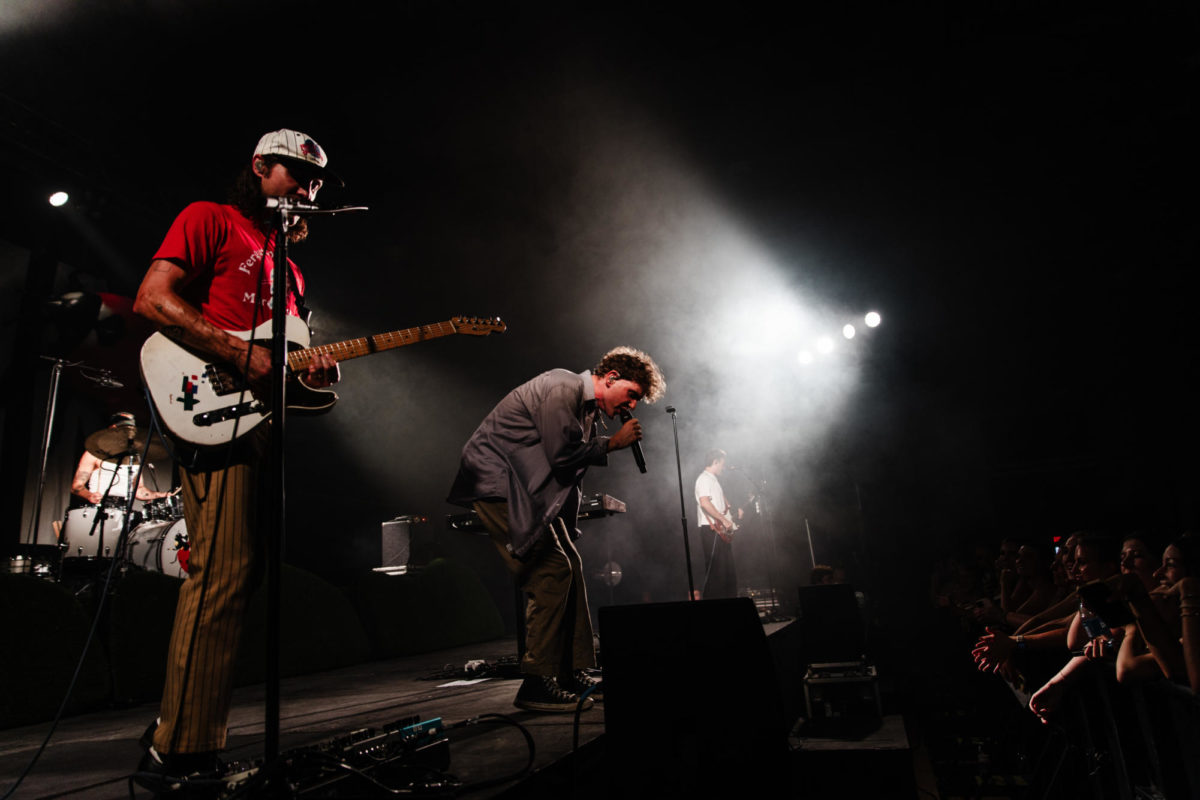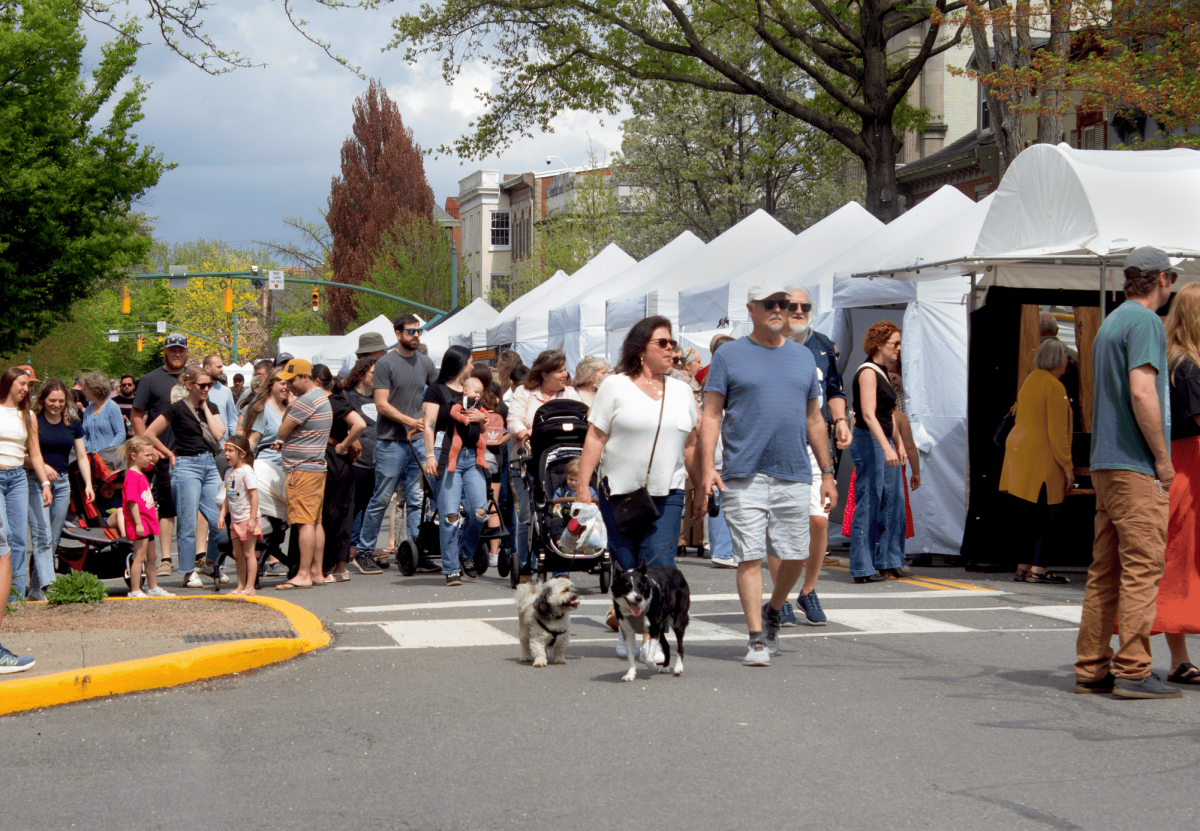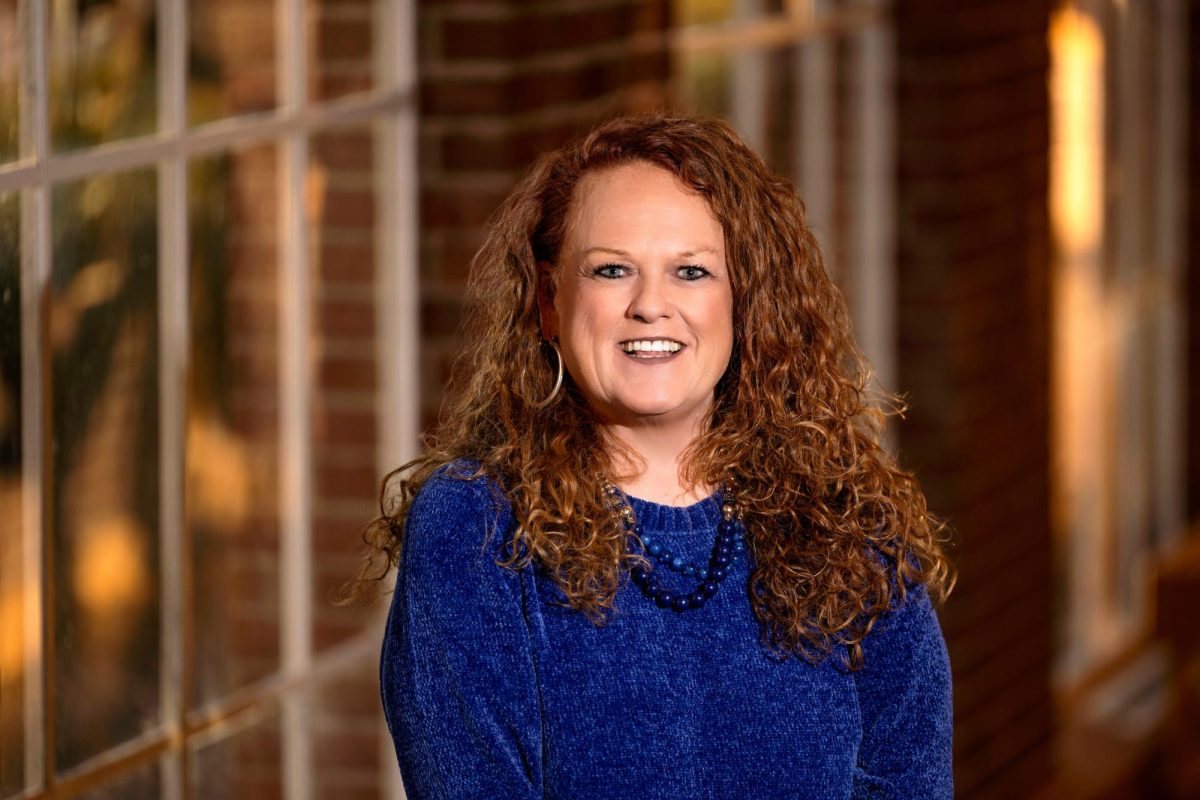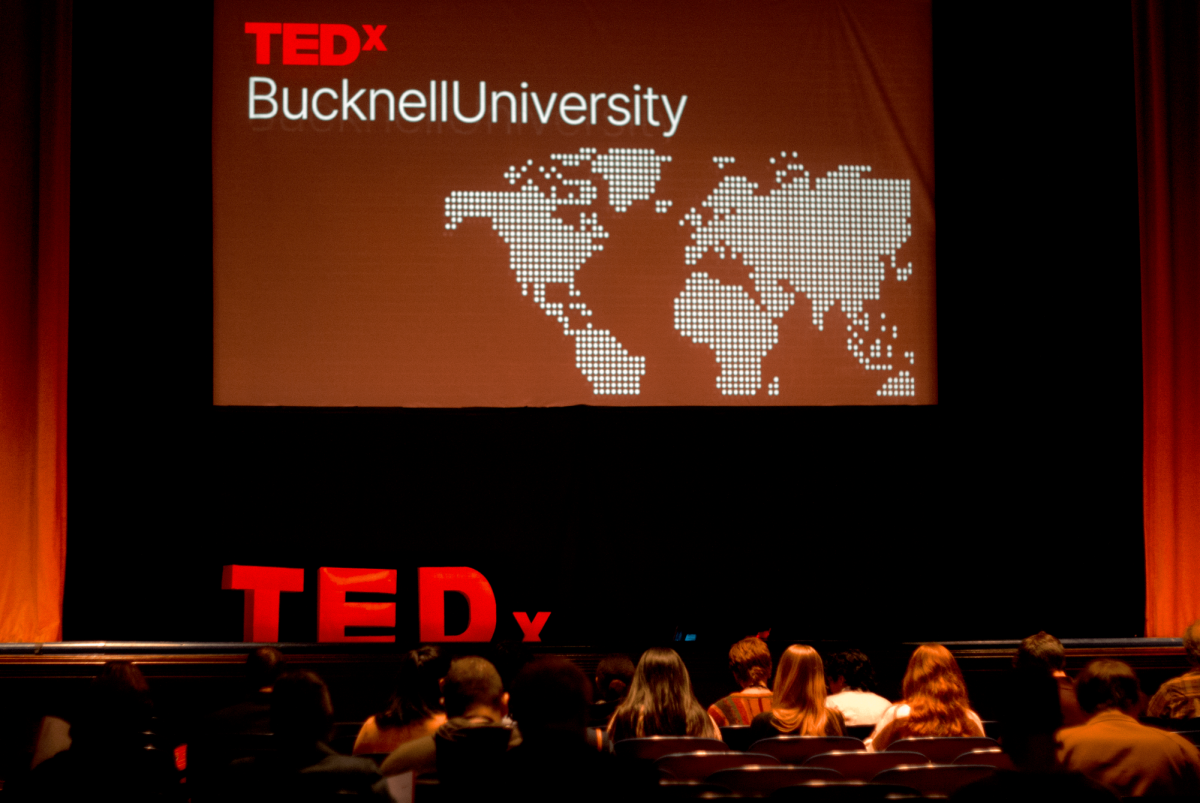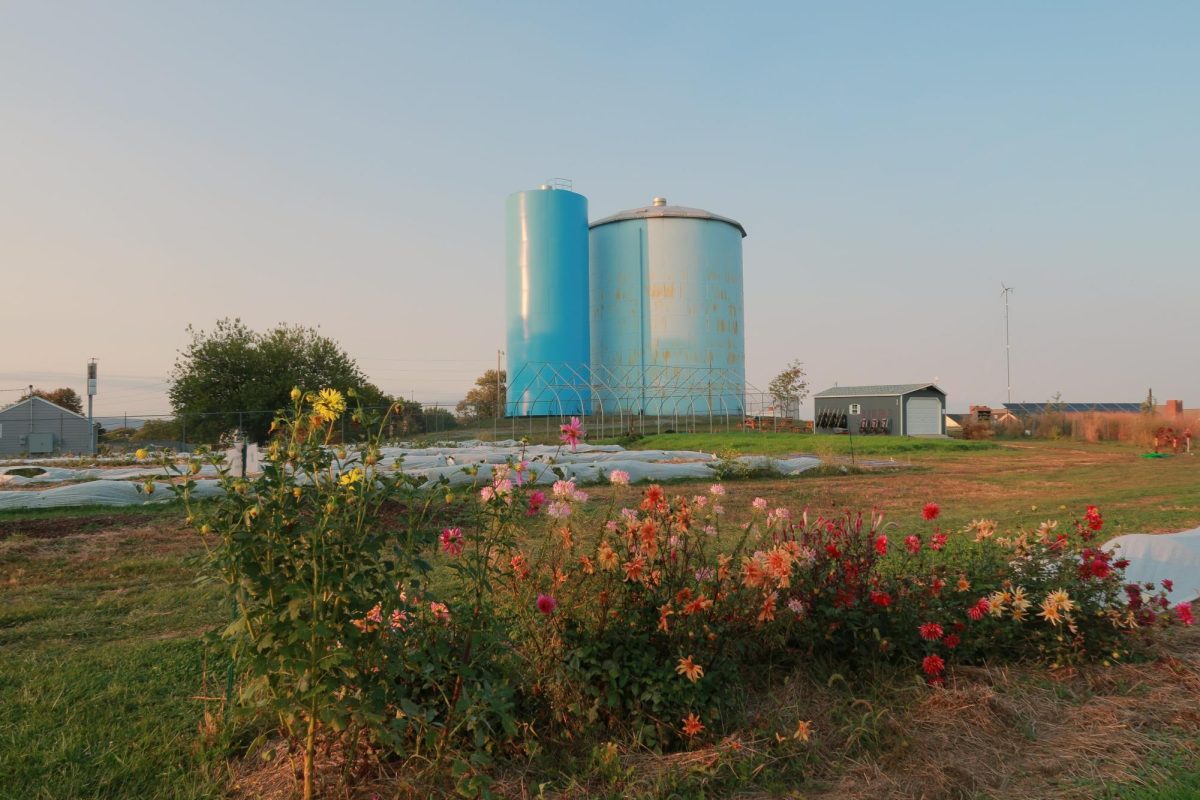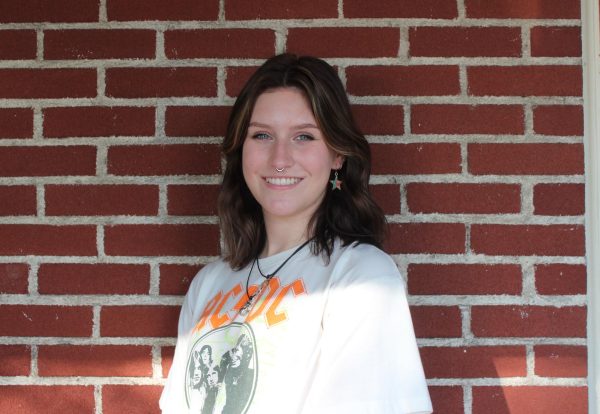The band COIN performed in Bucknell’s Gerhard Fieldhouse on Saturday, Sept. 9. COIN is based in Nashville, Tenn. and composed of members Chase Lawrence (lead singer), Joe Memmel (guitar), Ryan Winnen (drums) and Matt Martin (bass guitar).
How have college performances been different from the average tour performance?
Chase: I used to think it was really different, but I think now we’re just there to play our songs. And I used to think there were different paths or different kinds of shows, [but] it’s gotten to the place where we’re able to just show up and play the same show. My metric for the success of a show used to be in the hands of the audience… but it doesn’t have to be in anybody else’s hands except yours. So your enjoyment and fulfillment out of it’s the same no matter what; if there’s one person there, if there’s 1000, or if there’s 10,000.
Joe: The physical difference is like, yesterday we were outside, today we’re in a field house. You just never really know where you’re gonna be. But it’s fun. Diversity, honestly.
(To Ryan) You’re a visual artist–how has art impacted your music making and vice versa?
Ryan: [Art] is an individual practice, and [making music] is a collaborative practice. So it helps me to go between, because I feel like I make discoveries on my own that then allow me to be more fluid in the group. And we all do that, actually. So everyone has a different expression of it, but whenever we come back together, we have those new discoveries.
What was the creative process like for your most recent album, “Uncanny Valley?”
Chase: It was really different from albums in the past where we had just gotten together and wrote about lately. This one was very conceptual and very centered around our place in modernity and just figuring out what it looks like to be a human in the 21st century. We just used a character and told a story about what it means to be human.
I feel like we were at a place where the well wasn’t dry, but we had just made Rainbow Mixtape, and we had done so much with our friends, told so many true things and played so much with costume design. And we just created roles for ourselves to dress up in and tried new methods, new sounds and new aesthetics.
So coming out of that was almost like, “Whoa, I don’t know how to tell the truth anymore, a little bit.” So I needed a device personally to kind of get to the truth in me, so I always think that Uncanny Valley was a very true album that’s just cloaked in like digital artifacts and digital nuance.
What are some ways that you’ve noticed your music and the band itself has evolved over time?
Chase: Well, we talked about this last night. I feel like you start at this point and you only know what you know how to do. We listened to our old music last night–these old EPs that we made when we were in college. And Ryan would play the drum part, and nobody was telling him how to play the drum part. Joe would play the guitar part, and no one would tell him how to play the guitar part. And I would write the lyrics, and they would help some melodies, maybe… but we would just come together, and that was it. And we didn’t know how to tell each other how to do our thing.
It was that unbridled process… creativity, joy, freedom. We only knew how to do what we know, but along the way you learn so many different methods and tools of the trade and technology… and then so much changes. And I feel like you go into this rut and… you turn your back on what started the fire in the first place, because you get so good and you learn how to do things yourself.
I think it’s cool that I feel like we’re coming out of that rut… I feel like we just got back to the place that feels like we’ve made a full circle, kind of back to day one. I’ve said that a few times in the past but I’ve never really believed it, but I feel like [I finally do] now. I feel like we could literally do nothing on the song, and the song would still be “COIN.” I feel like it wasn’t that way for a long time, so I wanna say it’s changed a lot.
I’m getting emotional about it… because it’s so funny how people call it beginner’s luck, but it’s not beginner’s luck. It’s intuition, it’s skill, it’s talent, it’s love, it’s creativity, it’s freedom, it’s joy. All those things are at the beginning… It wasn’t luck. What started the fire was all those things.
What’s your favorite song to perform and why?
Chase: I really love playing “Malibu, 1992.” It continues to be the song that I feel like is the least effort to play. Which is really amazing when you play up there for like 90 minutes… especially for it to be six minutes long and to feel that easy to play… yeah, that’s not an accident.
Joe: I think today’s [favorite is going to] be “You Are the Traffic.” It felt nice in the fieldhouse during soundcheck. I think that’s what today’s gonna be… It’s kind of different every day.
Ryan: “Valentine,” almost always. I used to play in metal and hardcore bands, and they’re pop-punk sort of as well… and the way we play that song is almost an adaptation of aggressive music that I grew up playing. So it reminds me of that… and it’s different from our recording as well.
Matt: I think I agree with Ryan, as far as ones that we always play, “Valentine” is probably my favorite. But we added “Sprite” back on this trip to the U.K., and that we all had so much fun playing again. We played it a lot last year, but it’s nice to let songs come and go when it feels right. So right now, “Sprite” is also really fun.
How is the touring experience different in other countries?
Chase: It is different, but it’s getting increasingly “un-different.” Especially when you demystify the places and you continue to go there and you start seeing familiar faces. It can feel so daunting and scary at first, but you break that barrier and you realize that they’re just humans. They’re just lovely people looking for connection and company. It’s all love at that point, you know?
Joe: It’s fun connecting the personality dots, too, between people who like to listen to our music. Like in a city like London, compared to a city like Los Angeles… It’s all kind of similar personalities. It’s really nice because it’s like all the people who come and listen to our shows could all be best friends. You could all be like a big ol’ friend group.
What was one of your favorite performances, in general?
Chase: Hmm, I don’t know… Every show is such, like, I don’t wanna say blessing… but especially the more we do this, the more it can get mundane. But for some reason, the more I’m doing this, the more reverent I get toward it and the more honored I am to step on stage and be able to do this. I thought it would have the inverse effect, and it kind of did for a while… but I think it’s such a cool opportunity every single time.
But there are some special ones. I don’t know if they were special because of the timing, because of where I was in my life… but there was a show in 2018, I think, at The Garage in London. And I don’t know why… I don’t think it was any more special than this most recent London show. I just think it was the timing and availability for us. We’d never seen anything like people making circle pits to “Heart Eyes,” you know? It was a defining moment. I was like, okay, we can do this forever.
Joe: Midtown is another big one, but for me specifically, because of my ankle [injury]. I felt like I conquered it.
Matt: Sometimes what makes shows memorable are those little hurdles. Like, I’ll never forget Red Rocks because I was stuck in Denver traffic, missing sound check. And that’s insane, that’s why I remember Red Rocks. You should remember Red Rocks… because it’s Red Rocks.
Ryan: Days where everything goes right are like… the least interesting.
Chase: The Garage is a uniquely different one where everything went right and we remembered anyway. There’s only like three of those ever.
How is symbolism relevant in your music?
Chase: Well, I grew up in church [and Catholic school], so I was very involved in iconography. I feel like iconography has just played such an important part of my life… they’re symbols that remind you of why you’re there in the first place. I think that if you can create a symbol that reflects a feeling and a community and a camaraderie, then I think you should just repeat it over and over because it means something to you and then it means something to someone else. And then you create your own language.
Joe: It’s our own communication, in a loving way.
Chase: the “COIN language.”
Joe: Yeah, it literally is. And a lot of it comes from [Chase].
Ryan: You wanna be like someone’s favorite old T-shirt, you don’t wanna be something that gets traded in, you know?
Anything about new music?
Chase: We’ve experimented with a lot of new things, a lot of new methods. We’re trying to get back to what it felt like at the beginning. I think that’s the mission of our band, for sure. I feel like we’re on our way to like, the thesis of our band.



















